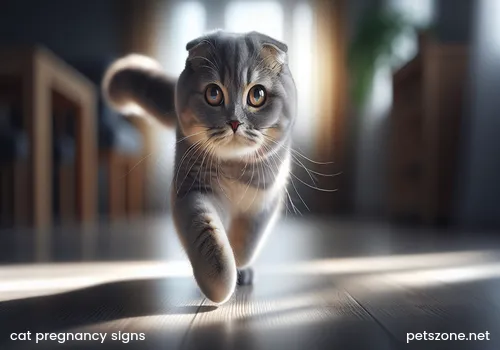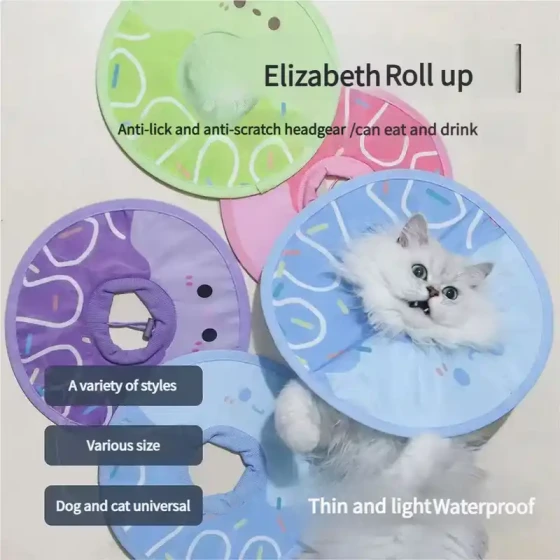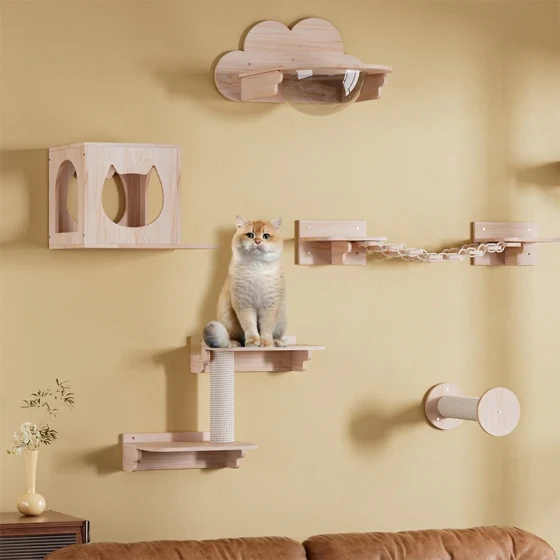8 Signs of Cat Pregnancy_These Behaviors Indicate Your Cat Is Going to Be a Mom

When the cat at home suddenly becomes a bit different, such as greatly increased appetite, gentle temperament, or more clingy to you, as a pet owner you might start wondering: Could she be going to be a mom? Early signs of cat pregnancy are indeed subtle and not easy to detect, but as time goes on, these signs become more obvious, usually including changes in nipple color and size, cessation of heat cycles, increased appetite, behavior changes, weight gain, abdominal enlargement, and nesting behaviors. Recognizing these signs early not only lets you prepare well to welcome the new life but also ensures the mother cat receives proper care during pregnancy.
8 Key Signs of Cat Pregnancy
A cat's gestation period usually lasts about 63 to 67 days, roughly around two months. During this special period, they undergo a series of physiological and behavioral changes. As a responsible owner, understanding these signs is crucial.
1. Nipple redness and swelling ("Pink nipples")
This is one of the earliest and most obvious physical signs of cat pregnancy, typically appearing around 15 to 18 days after conception. The pregnant cat's nipples become more reddish (especially noticeable in cats that have not given birth before), more prominent, and the surrounding fur may become sparse to facilitate future nursing. This phenomenon is vividly known as "pink nipples" or "nipple engorgement."
2. Cessation of heat cycles ("No more calling for heat")
If your female cat normally has regular heat cycles (commonly referred to as "calling," involving yowling, rolling, tail raising, etc.) but does not show these signs at the expected time, this is an important pregnancy signal. It indicates her hormone levels have changed and she is no longer in estrus.
3. Increased appetite and weight gain ("Eating well")
Just like human expectant mothers, pregnant cats need more nutrition to support fetal growth and development. You will notice her appetite significantly increases, becoming "eager to eat" with a big appetite. Correspondingly, weight starts to noticeably increase from mid-pregnancy, usually during the third or fourth week. Overfeeding can lead to obesity, which is unfavorable for delivery, so controlling food intake and choosing high-quality pregnancy cat food is necessary.
4. Behavioral changes ("Clingy" or "Independent cat")
Pregnancy affects cats’ emotions and behaviors. Some cats become unusually clingy, constantly wanting to snuggle beside you and seek more attention and affection; others may become more independent, quiet, or even somewhat lethargic. Their temperament may soften, but occasionally they might show irritability due to hormonal changes. These behavioral shifts reflect cats preparing for their impending new role.
5. Morning sickness (uncommon but possible)
Although not as common as in humans, some pregnant cats may experience "morning sickness" in early pregnancy (around the 3rd to 4th week), presenting as vomiting or loss of appetite. This is usually temporary and mild. If vomiting persists or is frequent, prompt veterinary consultation is needed to rule out other health problems.
6. Enlarged abdomen ("Big belly")
This is the most intuitive sign in late pregnancy. Around day 35 of gestation, or the fifth week, the cat’s abdomen gradually enlarges, becoming round and sagging. When touched, you might feel slight pulsations caused by fetuses moving in the amniotic fluid. By the end of pregnancy, the abdomen is very pronounced, and fetal movements can even be observed.
7. Sleepiness and fatigue ("Lazy")
Pregnancy is an energy-consuming process, especially in early and late stages. You will find your cat sleeps more than usual, often looking lethargic and less interested in playing. This is a natural response as her body is conserving energy for fetal development and delivery.
8. Nesting behavior ("Preparing delivery room")
As delivery approaches, the pregnant mother cat begins nesting behavior. She will search for a quiet, hidden, warm, and safe place, such as deep in a closet, under the bed, inside a cardboard box, or any cozy corner she prefers, repeatedly arranging, scratching, and pawing to set it up as an ideal "delivery room." This usually happens one to two weeks before the due date.
How to Confirm Cat Pregnancy
Although the above signs provide initial clues, the best way to confirm with 100% certainty whether your cat is pregnant is to seek professional veterinary help:
- Palpation: Veterinarians can gently palpate the cat’s abdomen around 20-30 days into pregnancy to feel the small sac-like fetuses inside the uterus.
- Ultrasound: This is the safest and most effective early diagnostic method. About 20 days into pregnancy, an ultrasound can clearly detect fetal heartbeats and sacs, and estimate the number of fetuses.
- X-ray: X-rays are typically used later in pregnancy (about 45 days or more) because fetal bones have calcified enough to show clearly on the image. This helps accurately count fetuses and assess their size and position in preparation for delivery.
Care Considerations for Pregnant Cats
Once pregnancy is confirmed, detailed care is key to ensuring the health of the mother cat and her kittens:
- Balanced nutrition: Provide high-quality, easily digestible pregnancy- or nursing-specific cat food. These foods usually contain higher protein, fat, and essential vitamins and minerals to meet the extra nutritional needs of the mother and fetuses. Avoid sudden food changes during pregnancy to prevent digestive upset.
- Comfortable environment: Offer a quiet, warm, and stress-free space. Especially in the late stage, prepare a comfortable birthing box placed in a familiar, undisturbed location.
- Gentle exercise: Mild exercise, such as short play sessions, is beneficial during early and mid-pregnancy to maintain strength and health. Reduce activity near delivery time to avoid vigorous jumping or running.
- Regular check-ups: Take the cat for regular veterinary prenatal visits to monitor the mother’s health and fetal development.
- Avoid medications: Do not give any medications, including dewormers or vaccines, without veterinary guidance during pregnancy, as some drugs could harm the fetuses.
- Emotional stability: Spend more time with your cat, offering affection and care to help her stay relaxed and happy.
Frequently Asked Questions
Q1: How long is a cat’s pregnancy?
A1: The average gestation period of a cat is about 63 to 67 days, roughly 9 weeks, depending on individual differences and breeds. Compared to a human’s “nine months,” it’s practically "rocket speed."
Q2: Can a pregnant cat eat regular cat food?
A2: Usually not recommended to feed only regular cat food. Pregnant cats need additional nutrition to support fetal growth and their own health. Standard cat food may not meet these needs. It’s advised to consult a vet and switch to high-energy, high-protein pregnancy or nursing cat food.
Q3: How do male cats behave when the female cat is pregnant?
A3: Male cats typically do not show obvious “pregnancy” signs. Some may show more interest in the pregnant female or continue attempts to mate. However, they do not experience physiological changes like females and cannot sense the presence of kittens.
Q4: Does a pregnant cat need any special supplements?
A4: Normally, if the cat eats high-quality pregnancy-specific cat food, additional vitamins or minerals are not necessary. Excessive supplementation could be harmful. All supplements should be used under veterinary supervision.
Summary
Cat pregnancy is a process full of surprises and challenges. As a pet owner, carefully observing subtle physiological and behavioral changes in your cat is the first step in identifying pregnancy. Once these signs appear, taking your cat to a vet for a professional diagnosis is critical to ensuring the health of the mother and future kittens. During pregnancy, providing balanced nutrition, a comfortable environment, and attentive care allows you to welcome new life with your cat and enjoy the warm moments of maternal love and filial affection.
References
- PetMD. "Signs of Pregnancy in Cats."
- VCA Hospitals. "Pregnancy and Parturition in Cats."
- RSPCA. "Pregnant Cats: Signs and Care."
- Hill's Pet Nutrition. "Caring for Your Pregnant Cat."



